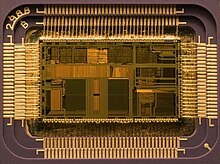Precision engineering

The precision engineering (also called Feingerätetechnik called) is an interdisciplinary field within engineering , which deals with the development and production of very small or precise products.
Selected (incomplete) examples for the application of precision engineering are:
- Medical technology
- measuring technology
- microelectronics
- microscopy
- Clocks
- Space technology
- Consumer electronics
Although often assigned to mechanical engineering in university education , precision engineering includes not only parts of this discipline but also other areas of knowledge such as:
A distinguishing feature from mechanical engineering are the often different goals in the design of components.
- In mechanical engineering, strength considerations are often sufficient.
- In order to achieve the highest precision or measuring accuracy , precision engineering products not only have to be stable. One aspect that goes beyond the requirement for security against breakage is the rigidity of individual parts and device structures.
In addition (with very small functional elements), physical laws of nature have different effects on the microscopic level than in the world that is directly accessible to humans. A well-known example is the capillary effect.
At a time when human life is increasingly determined by technology , precision engineering makes a significant contribution to protecting the environment . On the one hand, the consumption of resources in precision engineering products is lower than in conventional branches of industry; on the other hand, control and thus the protection of the environment can only be guaranteed by means of high-performance measurement technology.
education
At the University of Applied Sciences Kiel , University of Applied Sciences in Frankfurt , Nuremberg College and the University of Applied Sciences Karlsruhe is the course precision engineering in the degree program Mechatronics been transferred. This is also true for the Esslingen University , the University of Heilbronn and Furtwangen . At the Munich University of Applied Sciences , the course is now called Mechatronics / Precision Engineering.
At the Ernst Abbe University of Applied Sciences Jena , the Precision Engineering course is part of the SciTec department and is complemented by the physical engineering , laser and optotechnology, materials engineering , and photovoltaic and semiconductor technology courses in this department . Precision engineering is integrated into the mechanical engineering course at the University of Stuttgart and can be dealt with in more depth in the pre-diploma. At the TU Ilmenau , the specialization in precision engineering can also be chosen in the mechanical engineering department and dealt with in greater depth in the Bachelor and later in the Master. At the technical school in Dippoldiswalde you can complete the training to become a "state-certified technician for precision engineering".
The TU Dresden offers the degree course "Precision and Microtechnology" in the electrical engineering course. Since this course also includes a continuous engineering course, this training is completed with the title "Diplom-Ingenieur" (with a certificate of equivalence "Master of Science, M.Sc."). An independent master’s degree is also possible in this field of study.
Web links
- German Society for Precision Engineering eV Dresden
- Precision engineering at EAH Jena
- Institute for Precision Engineering and Electronic Design Dresden
- Feinwerk Wiki
- 100th birthday of Professor Siegfried Hildebrand, one of the founders of modern precision engineering
- 80 years of precision engineering at the TU Dresden (PDF; 153 kB)
- Precision engineering at the TU Ilmenau
- Precision engineering at the Esslingen University of Applied Sciences
Individual evidence
- ↑ Precision mechanics - focus on production ( page no longer available , search in web archives ) Info: The link was automatically marked as defective. Please check the link according to the instructions and then remove this notice. . In: Fachschule - BSZ Dippoldiswalde, version of November 24, 2010, accessed on November 27, 2010
- ↑ Diploma also after 2010
